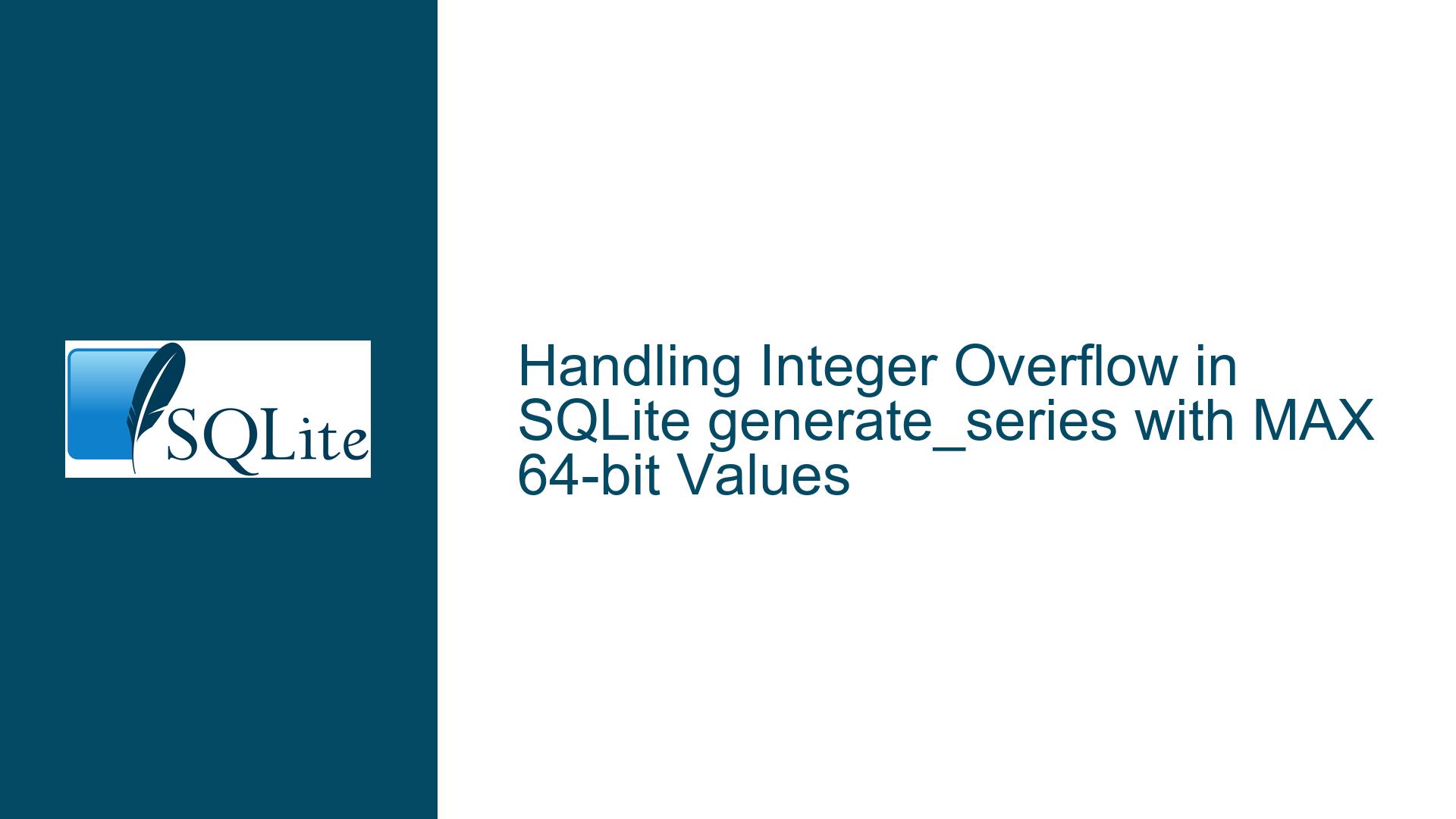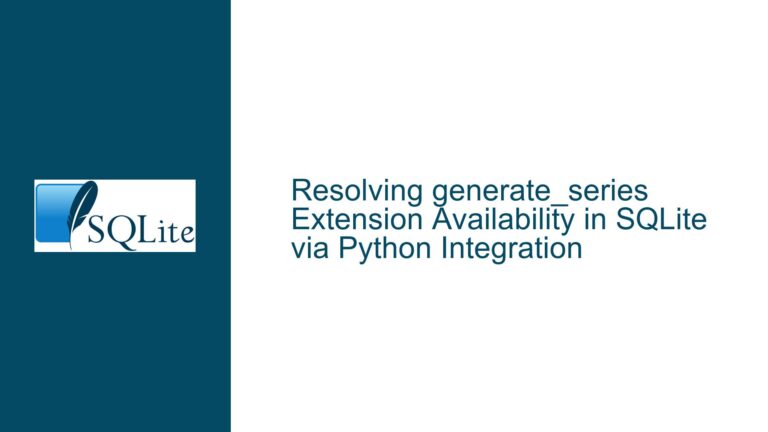Handling Integer Overflow in SQLite generate_series with MAX 64-bit Values
Issue Overview: Integer Overflow Triggers Infinite Loop in generate_series
The core issue arises when invoking SQLite’s generate_series table-valued function with a start parameter set to 9223372036854775807 (the maximum value for a 64-bit signed integer) and an end parameter equal to the start. The function enters an infinite loop instead of returning a single row, as expected. This occurs because the internal counter variable overflows into a negative value after incrementing beyond the 64-bit signed integer limit, violating the loop termination condition.
The problem is rooted in the way generate_series iterates through values. When the start and end parameters are identical, the function should immediately return the single value. However, due to the default step value of 1, the function attempts to increment the start value beyond the maximum representable 64-bit signed integer. This triggers a signed integer overflow, causing the counter to wrap around to -9223372036854775808 (the minimum 64-bit signed integer value). The loop then continues indefinitely because the termination condition (value <= end for a positive step) is never met once the counter becomes negative.
The behavior manifests in two observable symptoms:
- Unexpectedly Long Execution Time: Queries like
SELECT count(*) FROM generate_series(9223372036854775807,9223372036854775807)hang indefinitely. - Integer Overflow Warnings: Tools like Undefined Behavior Sanitizer (UBSan) detect runtime errors such as
signed integer overflow: 9223372036854775807 + 1 cannot be represented in type 'long long'.
This issue is particularly insidious because it affects edge cases where the start parameter is precisely at the 64-bit signed integer limit. Applications that dynamically generate generate_series parameters based on external data or calculations may inadvertently trigger this edge case, leading to degraded performance or resource exhaustion.
Possible Causes: Signed Integer Overflow and Loop Termination Logic
Cause 1: Increment Beyond 64-bit Signed Integer Limit
SQLite’s generate_series function uses a 64-bit signed integer (sqlite3_int64) to track the current value during iteration. The function increments this value by the step parameter (default 1) in each iteration. When the start value is 9223372036854775807, adding 1 results in a value (9223372036854775808) that exceeds the maximum representable 64-bit signed integer. This triggers undefined behavior per the C standard, though in practice, most compilers wrap around to the minimum negative value (-9223372036854775808) due to two’s complement arithmetic.
The overflow itself is not the root cause of the infinite loop. Instead, the loop termination logic fails to account for the overflow, leading to an incorrect evaluation of the termination condition.
Cause 2: Incorrect Termination Condition After Overflow
The termination condition for generate_series is determined by the direction of the step:
- If step is positive, the loop continues while
current_value <= end. - If step is negative, the loop continues while
current_value >= end.
After the overflow, the current_value becomes -9223372036854775808, which is less than the end value (9223372036854775807). Since the step is positive (1), the loop condition (current_value <= end) remains true indefinitely. The function continues generating values, decrementing the negative counter until interrupted externally.
Cause 3: Lack of Overflow Guards in generate_series Implementation
The generate_series implementation in SQLite prior to the fix did not include checks for integer overflow during iteration. While the function validates input parameters (e.g., ensuring step is not zero), it does not preemptively detect scenarios where incrementing the current_value would exceed the 64-bit signed integer limits. This omission allows the overflow to occur silently, leading to the infinite loop.
Troubleshooting Steps, Solutions & Fixes
Step 1: Validate Input Parameters to generate_series
Before invoking generate_series, ensure that the start, end, and step parameters do not create a scenario where the current_value will overflow. For example, if start is 9223372036854775807 and step is 1, the next iteration will overflow. Applications should implement boundary checks:
-- Safe usage: Avoid step=1 when start >= 9223372036854775807 - step
SELECT count(*)
FROM generate_series(
9223372036854775807,
9223372036854775807,
0 -- Step=0 disables iteration, returns only the start value
);
Step 2: Apply the Official SQLite Patch
The SQLite development team addressed this issue in commit 07383758d68e0502. The patch modifies the generate_series implementation to detect integer overflow during iteration. When an overflow is detected, the function terminates the loop immediately.
To apply the fix:
- Download the latest SQLite source code from the official repository.
- Apply the commit 07383758d68e0502 if not already included.
- Recompile SQLite with overflow detection enabled.
Step 3: Use Workarounds for Unpatched SQLite Versions
If updating SQLite is not feasible, use these workarounds:
Workaround 1: Use a Step of 0
A step value of 0 causes generate_series to return only the start value, bypassing the iteration logic:
SELECT count(*)
FROM generate_series(9223372036854775807, 9223372036854775807, 0);
-- Returns 1
Workaround 2: Explicitly Handle Edge Cases
Check if start equals end before invoking generate_series:
SELECT
CASE WHEN :start = :end
THEN 1
ELSE (SELECT count(*) FROM generate_series(:start, :end, :step))
END;
Workaround 3: Use a UNION to Simulate generate_series
For single-row results, combine generate_series with a UNION to handle the edge case:
SELECT 9223372036854775807 AS value
WHERE 9223372036854775807 = 9223372036854775807
UNION ALL
SELECT value FROM generate_series(9223372036854775807, 9223372036854775807)
LIMIT 1;
Step 4: Enable Runtime Overflow Detection
Compile SQLite with Undefined Behavior Sanitizer (UBSan) to catch integer overflows during development:
CFLAGS="-fsanitize=undefined" ./configure
make
This will surface errors like signed integer overflow at runtime, helping identify problematic generate_series invocations.
Step 5: Monitor generate_series Usage in Production
Log all generate_series calls with parameters close to the 64-bit signed integer limits. Use triggers or application-layer logic to flag suspicious inputs:
-- Example logging mechanism
CREATE TABLE generate_series_audit (
start_param INTEGER,
end_param INTEGER,
step_param INTEGER,
call_time TIMESTAMP
);
CREATE TRIGGER log_generate_series_calls
BEFORE INSERT ON generate_series
FOR EACH ROW
BEGIN
INSERT INTO generate_series_audit
VALUES (NEW.start, NEW.end, NEW.step, CURRENT_TIMESTAMP);
END;
Step 6: Understand SQLite’s Integer Handling
SQLite stores integers as 64-bit signed values. Operations exceeding these limits are not automatically promoted to floating-point or arbitrary-precision types. Applications must explicitly handle boundary conditions. Use the typeof() function to inspect value types:
SELECT typeof(9223372036854775807); -- Returns 'integer'
SELECT typeof(9223372036854775808); -- Returns 'real' (if not using -DSQLITE_INT64_TYPE)
Final Solution Summary
The infinite loop in generate_series when using the maximum 64-bit signed integer is resolved by:
- Upgrading to a SQLite version with the overflow detection patch.
- Validating input parameters to avoid overflow scenarios.
- Using workarounds like step=0 or conditional logic for edge cases.
By addressing the root cause (unchecked integer overflow) and implementing safeguards, developers can prevent this issue from impacting their applications.






